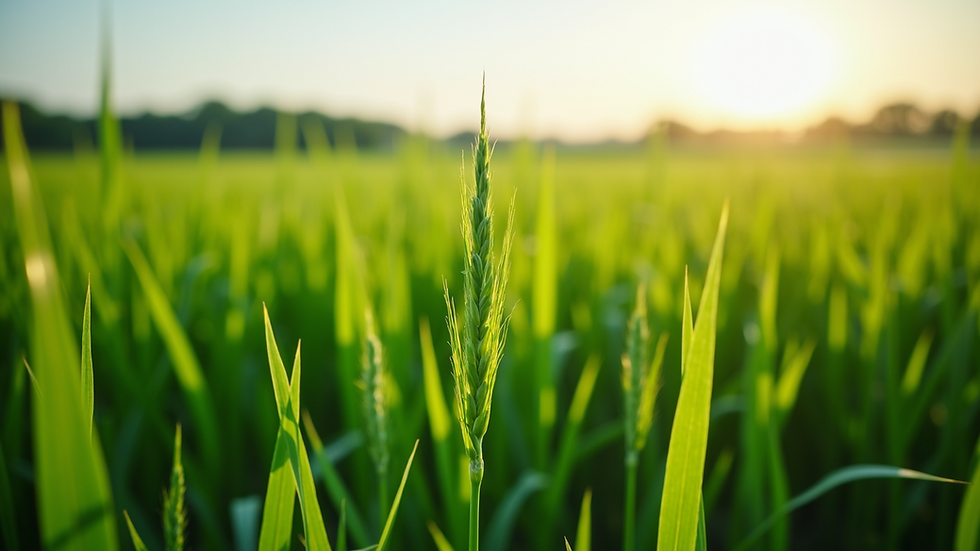Innovative Techniques for Sustainable Farming
- Ayush Patel
- Aug 7, 2025
- 3 min read
Sustainable farming is no longer just a trend; it is a necessity for the future of agriculture and the planet. As the global population grows and climate change impacts farming conditions, adopting innovative and eco-friendly practices is essential. Modern sustainable farming methods focus on increasing productivity while preserving natural resources, reducing environmental impact, and supporting local communities. This article explores some of the most effective and innovative techniques that farmers can implement today to ensure a greener and more resilient agricultural future.
Exploring Modern Sustainable Farming Methods
Modern sustainable farming methods combine traditional knowledge with cutting-edge technology to create systems that are both productive and environmentally responsible. These methods aim to optimize resource use, improve soil health, and reduce waste. Some of the key approaches include:
Precision Agriculture: Using GPS, drones, and sensors, farmers can monitor crop health, soil moisture, and nutrient levels in real-time. This data-driven approach allows for precise application of water, fertilizers, and pesticides, minimizing waste and environmental damage.
Agroforestry: Integrating trees and shrubs into crop and livestock systems enhances biodiversity, improves soil structure, and provides shade and wind protection. This method also helps sequester carbon, contributing to climate change mitigation.
Crop Rotation and Polyculture: Rotating crops and growing multiple species together reduces pest outbreaks, improves soil fertility, and increases resilience against extreme weather.
Organic Farming: Avoiding synthetic chemicals and using natural inputs like compost and biological pest control supports soil health and biodiversity.
These methods not only improve yields but also help maintain the ecosystem services that farming depends on.

What is the Most Sustainable Way to Farm?
Determining the most sustainable way to farm depends on local conditions such as climate, soil type, and available resources. However, a holistic approach that combines several techniques tends to be the most effective. Key principles include:
Soil Health Management: Healthy soil is the foundation of sustainable farming. Practices like cover cropping, reduced tillage, and organic amendments improve soil structure, water retention, and nutrient cycling.
Water Conservation: Efficient irrigation systems such as drip irrigation and rainwater harvesting reduce water use and prevent soil erosion.
Integrated Pest Management (IPM): Combining biological control, habitat manipulation, and selective pesticide use minimizes chemical inputs and protects beneficial insects.
Renewable Energy Use: Incorporating solar panels, wind turbines, or bioenergy reduces reliance on fossil fuels and lowers the carbon footprint of farming operations.
Farmers who adopt these principles create resilient systems that can adapt to changing environmental conditions while maintaining productivity.

Innovative Technologies Driving Sustainable Agriculture
Technology plays a crucial role in advancing sustainable farming. Innovations are making it easier for farmers to implement eco-friendly practices and improve efficiency. Some notable technologies include:
Soil Sensors and IoT Devices: These tools provide real-time data on soil moisture, temperature, and nutrient levels, enabling precise management.
Autonomous Machinery: Self-driving tractors and robotic harvesters reduce labor costs and minimize soil compaction.
Vertical Farming and Hydroponics: These soil-less farming methods use less water and land, making them ideal for urban areas and regions with poor soil quality.
Biotechnology: Developing crop varieties that are drought-resistant, pest-resistant, or nutrient-efficient helps reduce the need for chemical inputs.
By integrating these technologies, farmers can optimize resource use, reduce environmental impact, and increase food security.

Practical Steps to Implement Sustainable Farming Techniques
Farmers interested in adopting sustainable practices can start with simple, actionable steps:
Conduct Soil Testing: Understand your soil’s nutrient status and pH to tailor amendments and avoid over-fertilization.
Start Cover Cropping: Plant cover crops during off-seasons to protect soil from erosion and add organic matter.
Adopt Crop Rotation: Plan crop sequences that break pest cycles and improve soil fertility.
Use Mulching: Apply organic mulch to conserve moisture, suppress weeds, and improve soil health.
Implement Water-Saving Irrigation: Switch to drip or sprinkler systems and schedule irrigation based on crop needs.
Encourage Biodiversity: Plant hedgerows, maintain natural habitats, and use companion planting to support beneficial insects and wildlife.
Farmers can also seek advice from agricultural extension services or join local sustainable farming networks to share knowledge and resources.
The Future of Farming: Embracing Sustainability
The future of agriculture depends on how quickly and effectively farmers adopt sustainable practices. Governments, researchers, and businesses are increasingly supporting sustainable farming through policies, funding, and innovation. Consumers also play a role by choosing products grown with respect for the environment.
By embracing modern sustainable farming methods, farmers can:
Improve long-term productivity and profitability
Protect natural resources like soil and water
Reduce greenhouse gas emissions
Enhance food security and nutrition
For those looking to explore more about sustainable farming techniques, numerous resources and communities are available to guide the transition.

Sustainable farming is not just a practice but a commitment to nurturing the land for future generations. With innovation and dedication, it is possible to feed the world while preserving the planet.




Comments